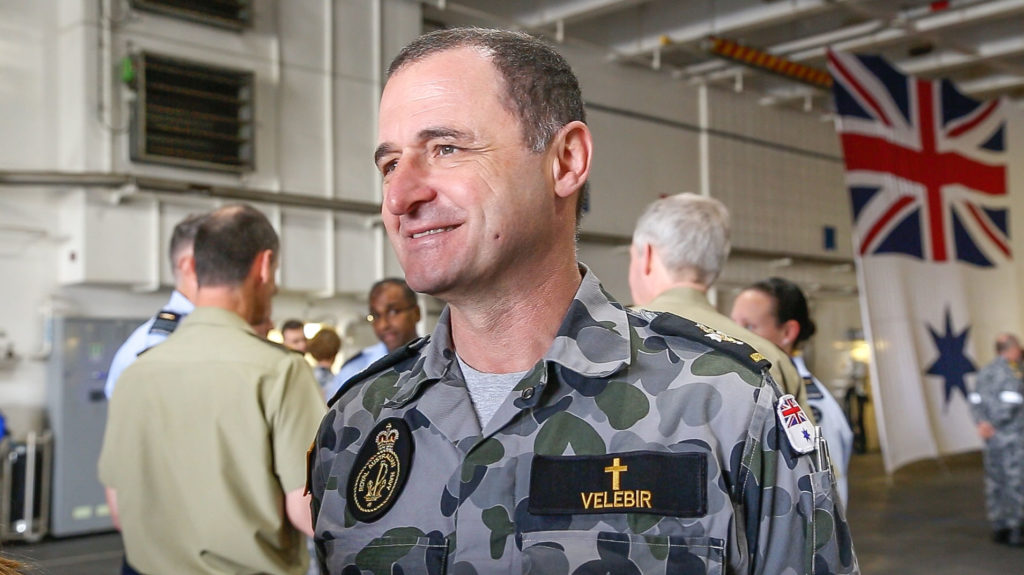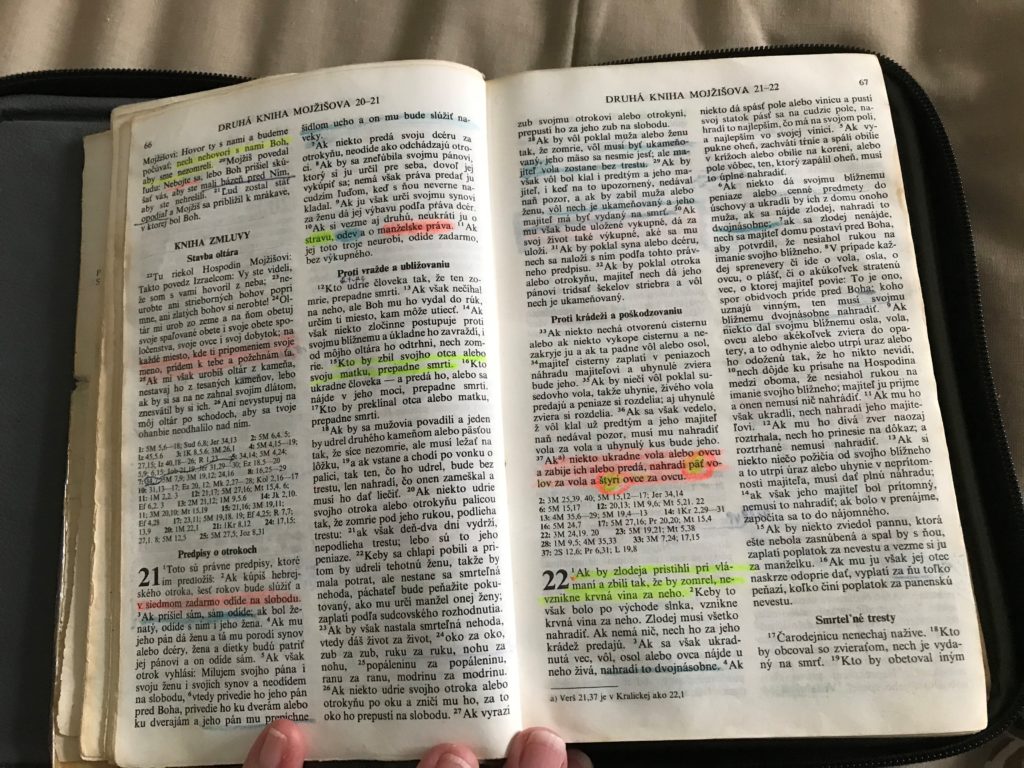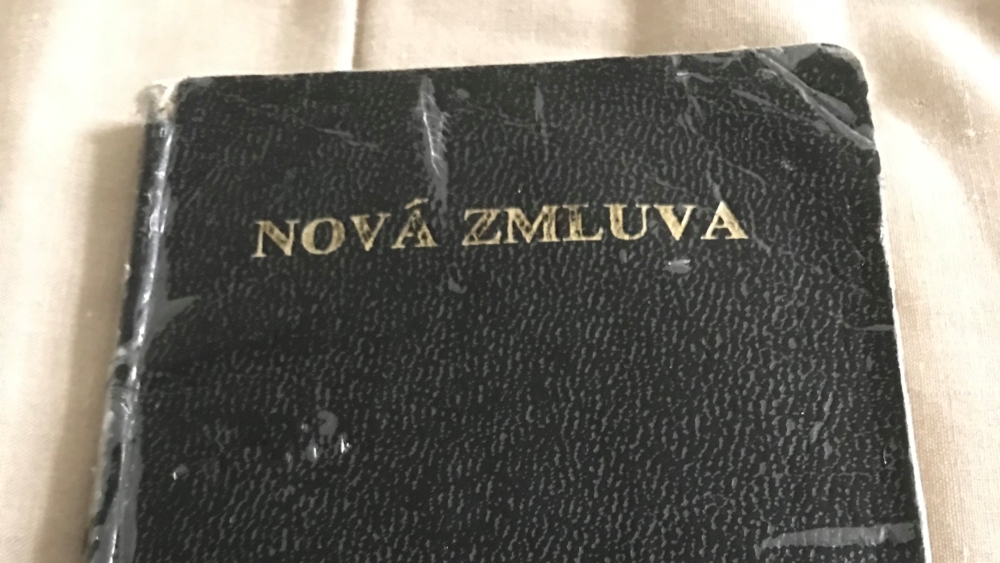Australian Navy chaplain Miloslav Velebir finds it hard to relate to Christians who can’t be bothered to read their Bible. It’s something he has never taken for granted.
Born and raised in communist Czechoslovakia, there wasn’t a solid translation of the full Bible available in his Slovakian mother tongue.
Slovakian Christians had had some translations done earlier, but most of them were significantly lacking, linguistically or theologically. But all Slovakian Christians knew a group of scholars were working on a new, full translation in their heart language, and eagerly awaited its arrival.
Until that day, Miloslav, then a teenager, simply had to make do with a small illegal copy of the New Testament that he read secretly under the desk at grammar school (high school, in Australia).

Under the communist regime, the Evangelical Church of the Augsburg Confession in Slovakia was only officially permitted to publish two Christian publications per year. Even these two chosen texts were thoroughly checked for any subliminal messages and censored by the government’s Ministry of Culture and secret police.
Consequently, most of their Christian literature – like Miloslav’s small New Testament – was printed abroad and smuggled into the country.
They were printed without any acknowledgment of the printer and, usually, with only a title and author displayed – and nothing else. If the author was Czechoslovakian, then there was no author printed either.
“It was safer that way,” Miloslav explains.
A few years later, he found his illegal New Testament fitted nicely into the pocket of his army uniform as he served his compulsory military service.
“I read it in all possible and impossible places, like standing daily in lines for lunches and dinners; on secret army exercises at the German border with Russian generals in sight; hiding behind the chimney in the roof of our army barracks as I sneaked out of my duties to spend ten minutes praying with my fellow Christian soldier (‘Baptist, Pentecostal or anything – we didn’t believe in labels, we were one in Christ’),” remembers Miloslav.
He found the Bible a perfect conversation starter with others who asked him what he was reading.
“I even read it to the officer who was second in command of the whole barracks, who called me in to help him type some secret documents … After I did the work, he kept on asking many questions about my faith and for an hour-and-a-half he listened intently.”
“He had never heard the gospel before. I used any opportunity to share its contents with wondering onlookers.
“That little New Testament has seen a lot in its years.”
Miloslav almost lost the treasured book when it was confiscated, after his books had been gone through. However, it was returned after Miloslav’s mother wrote to the authorities and successfully persuaded them that it was controlling behaviour on the part of the state for it to be taken.
The state was always wanting to avoid the accusation of being controlling, says Miloslav – “repressive but not controlling” he clarifies.
Yet even with his trusty New Testament, Miloslav was always waiting for the day when he would receive a translation of the whole Bible in his mother tongue.

“It took a while to get to us,” he recalls. “It was printed by the Bible Society in South Korea and brought to our border, but the communist government was not so keen to let it into our country.
“Trucks with 30,000 Bibles – from memory, that was the number printed at first – were held for a number of weeks at the German border to Czechoslovakia.
“Only after numerous interventions and pressure from our friends and Christians from abroad, the trucks were let in.
“I got my first Bible in 1979 when I was 17.”
Once it was within his possession, Miloslav embarked on a lifetime of voracious Bible study and reading his Bible from cover to cover.
After grammar school, Miloslav embarked on theological studies, although even that wasn’t simple. His school principal, who would usually sign a student’s application for tertiary study, ripped up his application. But Miloslav persevered, contacting the college and was granted an application as a private citizen.
“Even before I had been accepted into the theological seminary where I would begin to learn the original biblical languages, I read my whole Bible three times, and my New Testament five times.”
Since then, Miloslav has had to change the cover of his beloved Bible a couple of times and have it rebound, because it started to fall apart. “It is still my most favourite Bible, since it reminds me of those wonderful times when we were under the communist propaganda and persecution. They were times of real growth, hardships and so much joy in being considered, at least mildly, to suffer a little for our Lord Jesus. We didn’t have it that bad and we were always mindful of millions of those who pay a price – even the ultimate sacrifice of death – in many places of the world.”

Miloslav’s father, Jan (John) Velebir is retired now and is 87 years old. He shares Miloslav’s passion for the Bible and has read his from cover to cover 53 times.
Jan was a Lutheran pastor under the communist regime. Like all pastors, he was an employee of the state under the Ministry of Culture so that the state could control – “repress” – his activities. As a deterrent, pastors were paid badly (about half the minimum wage).
Miloslav remembers one occasion when he hid illegal Bibles in a hidden compartment in a cupboard in his father’s own church. This gave his dad plausible deniability when the police questioned him over them – which they did.
Another memory is of a time when the church had a group of 27 young people coming for an event, but were forced to cancel. It turned out to be all under God’s control when police came looking for the young people, only to find them not there.
Miloslav became a pastor in 1986 and worked in his home country until 1991, when his first wife passed away and he then moved to Melbourne. In 2006, he moved to Perth in Western Australia, where he started speaking English, and spent 11 years pastoring a church there. He remarried and between him and his wife, they now have seven kids and eight grandchildren.
Living in Australia after his communist childhood has only strengthened Miloslav’s passion for the Bible.
“After migrating to Australia I realised that the slavery of consumerism and prosperity offered by the Western lifestyle, mean that many people can never truly understand the true price of being a disciple of Jesus,” Miloslav says.
“It is so much harder to be a Christian when life is so easy and comfortable.
“How can people here understand, ‘Whoever loses his life for me and for the gospel…’?
“My Bible reminds me of that all the time.”
In 2017, Miloslav joined the Australian defence forces as a Navy chaplain because, in his own words, “he was nearly ready for retirement”.
But talking to the 58-year-old makes it clear that chaplaincy has not at all slowed him down from doing what he loves most – sharing the Bible with others.
“I spend 95 per cent of my time dealing with non-Christians,” he tells me. “I have given away 40 to 50 Bibles.”
“I recently met with a non-Christian whose grandfather was sick and we had a conversation about life and death. Forty minutes later, he gave his life to the Lord,” he says and shrugs, raising his palms upward.
His message is clear as a bell. Miloslav obviously thinks he has the best job in the world.
“Who wouldn’t want this job?” he asks with the gesture.
Email This Story
Why not send this to a friend?


